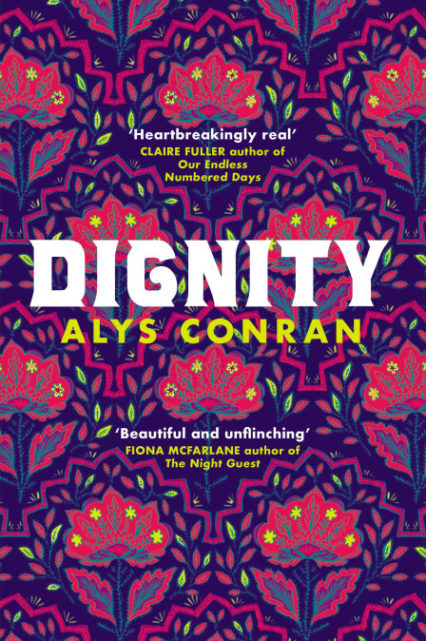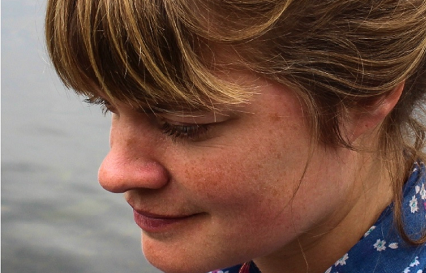May’s Book of the Month is Alys Conran’s new novel Dignity, which won the first vote by quite a margin, beating both Hummingbird and A Simple Scale to be the first book club read.
This month marks the beginning of the Wales Arts Review book club. The club’s ethos is to celebrate great fiction from Wales, and to maintain a community feel by asking members to vote on which book to read each month. By putting home-grown writing on the agenda, we hope to inspire a community platform where literary gems from Wales, and the authors of them, are more widely celebrated. If this sounds like something you would like to be a part of, like the Facebook page.
Alys Conran is originally from north Wales, and as well as being a writer of fiction she also writes poetry, creative non-fiction, creative essays and literary translations. Her first novel Pigeon (Parthian) won the Wales Book of the Year Award 2017 and was shortlisted for the International Dylan Thomas Prize. It also won the Rhys Davies Trust Fiction Award, The Wales Arts Review People’s Choice Award and was longlisted for the Author’s Choice First Novel Award. Dignity is her newly released second novel, and follows the unlikely friendship of Magda, a former scientist with a bad temper and a sharp tongue, and Shusheela, her young, grief-stricken carer.
The following interview features questions from book club members.
Rosie Johns – Where do you write? Do you maintain an organised writing space, or when writing Dignity did you just find yourself progressing through the story whenever (and wherever) inspiration struck?
Alys Conran: When I was writing Dignity, I was mainly working in my garden shed. In fact, to call it a garden shed is a little misleading, it was a purpose built little building in my garden in Gerlan, overlooking the mountains, and was built by my father in law as a wedding present. I loved it there. We’ve moved house to the other side of Dyffryn Ogwen, and at the moment I’m writing in the spare room, but I miss the shed, and we’ll be building a new one soon.
I’m not particularly disciplined about writing, and I think it requires playfulness as much as discipline, but I do like to write in the mornings, before my head fills up with other things. That’s why sheds are good. In the shed there’s nothing else to think about, just the writing.
 Was the experience of writing Dignity different to writing Pigeon? How did the success of your first novel affect and inspire you?
Was the experience of writing Dignity different to writing Pigeon? How did the success of your first novel affect and inspire you?
Alys Conran: Pigeon wasn’t out when I was writing the first draft of Dignity. In fact, for a part of the writing of Dignity, I didn’t even know that Pigeon was going to be published.
The main difference with Dignity was that I knew I could get to the end of a novel, because I’d done it once before. I also worked a lot more from historical documents, books, and objects that I had to hand. I had to study, to fuel up consciously for writing, which hadn’t really been the case with Pigeon. But in both cases I just sort of dreamed the story into existence. I can’t quite believe that they came from me, and in many ways I don’t think they did.
The idea of belonging and identity is central to Dignity‘s narrative, and since the Welsh language was so important to the characters and communities in Pigeon, what was the thought process for having Shusheela not be a Welsh speaker? Was this a key component in the exploration of identity and belonging in the book for you?
Alys Conran: There’s an assumption in the question that Dignity is set in Wales, when there’s nothing in it to clearly indicate either way. All we know is that it’s set in a place called Bay’s Mouth, where the hotels are all called imperial names. The elderly Mrs Jenkins, a minor character, is the only Welsh speaker, and the narrative points out that she is far from her home, so she could be anywhere, Wales or England. Either way, she is out of place and seems very lost. If Susheela or Ewan, or anyone else in the book was identified as a Welsh speaker, it would give a placeness to Bay’s Mouth by setting it concretely in Wales, when actually Bay’s Mouth isn’t allowed to be a place at all in the novel, because it’s too busy being a carefully cultivated simulation of Britishness.
When I was exploring the setting I spent time in various seaside towns including Torquay, Llandudno, Rhyl and Weston-Super-Mare, and I constructed my own town from elements of their seafronts. But it isn’t set in any of those places specifically, or specifically anywhere at all. In fact, the book is about the way the Empire negated places and people, and about the way narrow, iconic ideas of Britishness still do. I intentionally didn’t reveal what reality was being denied by the simulation, because I wanted to focus on the simulation itself, and on the way it perpetuates itself. We don’t get to know what is behind that pretence either in Bay’s Mouth or in India.
If it is set in Wales, and we’re not sure if it is or not, I would say it’s a Wales in which Welsh identity is utterly denied, so much so that it is off the page. The narrow idea of Britishness which Bay’s Mouth’s seafront represents imposes itself at the expense of other more complex and meaningful identities, of which Susheela’s is one, and Mrs Jenkins’ too. No one really wins in fact, not even Magda, because the simulation is just a simulation and so isn’t true for anyone.
The interlinked histories and perspectives in Dignity shine a light on the different ways women have been, and still are, oppressed and repressed – socially, within relationships, in their careers and even by their bodies. Was it difficult exploring the darker sections of your female characters’ stories?
Alys Conran: When I’m writing the material you call dark, it’s sometimes as if I’m not there at all, as I’m so focused. I think most women have a traumatic relationship with their own bodies in some way. Speaking from that trauma isn’t painful in itself, it’s letting yourself breathe. Editing it though, can be painful, because you’re reopening the wound time and time again, and however fictional and however distant from my own experience what I’m writing is, the wounds I use to write with are real.
One emotional thread of the story is the experience of carers and elderly individuals in care. You describe, quite accurately it seems, the time pressure and emotional stress carers are put under, and the sheer indignity of having to be cared for. Is this something you feel passionately about?
Alys Conran: It’s something I’ve spent a large part of my adult life thinking about, because my father was in need of care from when I was in my mid-teens until he died five years ago. I saw the social care system put under more and more pressure. Right now there are so many people out there, lonely in their homes, in trouble, and there are thousands of carers turning up to work in jobs that are zero hours and just horrendously pressurised and poorly valued. We ignore it, and yet being cared for is something almost all of us will have to deal with – an almost universal experience. Those relationships between the carers and cared for are really vital, fascinating human relationships, and I think a barometer of how we are faring as a society. In practical terms, many social care visits are painfully shortened by the rotas carers are having to work to, with barely enough time to cater for basic personal hygiene and health needs or, to put it bluntly, hunger. Often carers are encouraged to professionalise and limit interactions because the time frame is so tight, and carers who do develop real friendships with those they care for are frequently moved on. The extraordinary thing though, is that within all that, some beautiful rebellions happen. People really come to care for each other, despite the system, its health and safety requirements, rotas and humiliations, and I wanted to write about the painful beauty and dignity of those friendships. A friendship between a carer and the person they care for takes bravery and humanity. It is a heroic thing, on both sides.
Are there any projects you are currently working on that you can tell us about? Are there any events we can look forward to?
Alys Conran: I’m going to be at Hay this month, in an event alongside Tishani Doshi, whose novel, Small Days and Nights, I’m currently reading, and I’ll be at the Edinburgh festival in August too. I’m also off to Berlin in June to talk about both Pigeonand Dignity, and there are several other trips abroad planned for this year, as well as events in Wales, like at the wonderful Gwyl Arall. I’m teaching of course, Creative Writing, at Bangor, which keeps me very busy and buzzing with all my students’ ideas and stories, and also teaching a course at Tŷ Newydd. Meanwhile I’ve started another novel, which I won’t tell you about in case it disappears. After that, I think I want to write poetry and non-fiction for a bit. But novels are tyrants and tend to take me over.
Thank you Alys Conran for the insightful interview. It’s been a pleasure.
You might also like…
Two years ago Alys Conran was just another struggling writer, waiting for her debut novel, Pigeon, to be published by independent Welsh publisher Parthian Books. But now, at the end of 2017, she is a multi-award-winning novelist, winner of three awards at this year’s Wales Book of the Year to add to a shortlisting for the International Dylan Thomas Prize. Already, many view Conran as a senior figure on the Welsh literary scene. Gary Raymond caught up with Alys to discuss an exciting year.
Rosie Johns is a regular contributor to Wales Arts Review.












